The painful history of the 228 Incident — and the torment and grief that families of its victims still feel — were brought into sharp focus yesterday by Taipei Mayor Ko Wen-je (柯文哲) when he delivered an emotional speech at the government’s memorial ceremony, after which it appeared that he refused to shake hands with President Ma Ying-jeou (馬英九).
During his address at the 228 Memorial Park in Taipei yesterday, Ko choked up several times when talking about his grandfather, Ko Shih-yuan (柯世元), who survived the 228 Incident in 1947, but died three years later of the injuries he reportedly suffered after torture and beatings by Chinese Nationalist Party (KMT) troops.
Ko Wen-je’s father, Ko Cheng-fa (柯承發), also attended the event.
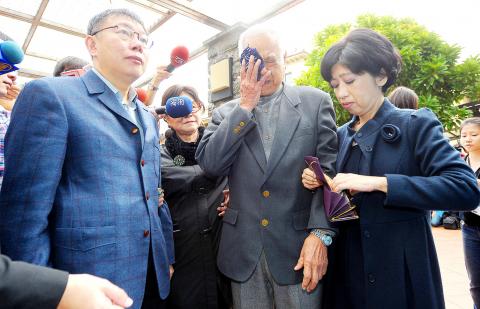
Photo provided by Taipei Photojournalists Association
It was the mayor’s first time addressing a national audience at a 228 memorial since taking office.
Ma, Premier Mao Chih-kuo (毛治國) and other KMT government officials were also in attendance.
Ko is the first Taipei mayor whose family suffered directly in the 228 Massacre, and he was invited to represent victims’ families.
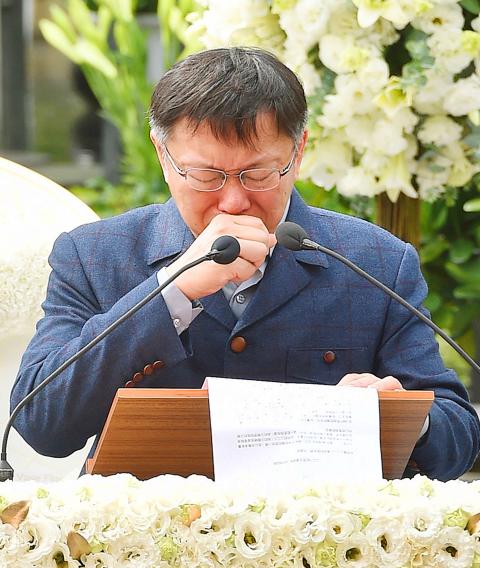
Photo: Liao Chen-hui, Taipei Times
Observers said that his taking the central stage at the memorial was an important occasion, charged with political symbolism and historic meaning for Taiwanese.
“Just how painful was the aftermath of the 228 Incident? It is suffering that went beyond words. My father never wanted to talk about what happened to his father. He did not want our generation to bear the suffering of the older generation,” Ko Wen-je said.
“We must have the truth; then we may forgive. Only then can we have reconciliation and peace,” he added. “We must not allow such a tragedy to happen to our children and our grandchildren. This is the responsibility of our generation. Only when there is justice in government can we have harmony in society — and have a future for our nation.”
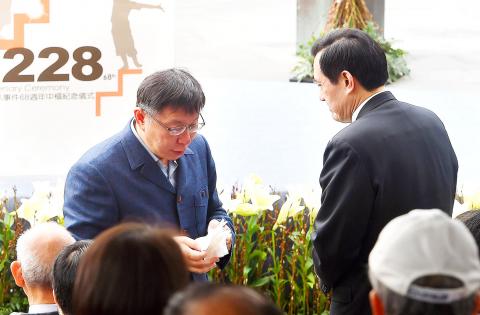
Photo: Liao Chen-huei, Taipei Times
“Not knowing much about my grandfather, I learned about him from history and from old photographs. I got to know about my grandfather only by the tears my father shed at each year’s 228 commemoration services,” he said.
“During that sorrowful and grieving time of 1947, many Taiwanese lost their families, relatives and friends,” he said. “Society also lost many intellectuals and its elite. It also left a legacy of fear and terror in Taiwan’s history, which resulted in silence and divisions between people, creating an invisible, cold-hearted wall that still divides society today.”
Ko Wen-je frequently wiped away tears.
After his speech, he twice appeared to decline shaking hands with Ma.
As Ma first offered a handshake, Ko waved his hand in a gesture of refusal after leaving the podium. At the end of the ceremony, Ma shook hands with family members of victims and again offered his hand to Ko, who apparently refused again.
Ko Wen-je’s mother, Ho Jui-ying (何瑞英), dismissed speculation over her son’s behavior when reporters sought comment later in the afternoon about the episode, which triggered a flurry of media reports.
It would have been rude for Ko to shake hands with the president, because her son was holding a soiled tissue, Ho said.
“He could not just throw the tissue on the ground out there. With the tissue in his hand, he was unable to shake President Ma’s hand,” she said.
During yesterday’s event, several groups organized separate protests against Ma and the KMT outside the ceremony venue.
Protest organizers and participants including the Taiwanese National Party, the Organization for Taiwanese National Declaration and the Taijimen group, which led to brief confrontations with police officers deployed to provide security.
Additional reporting by Shih Hsiu-chuan
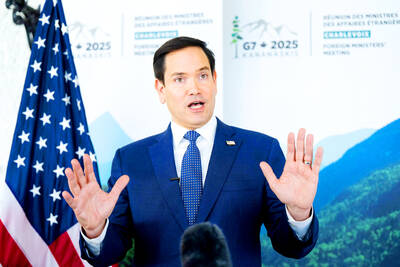
‘CROWN JEWEL’: Washington ‘can delay and deter’ Chinese President Xi Jinping’s plans for Taiwan, but it is ‘a very delicate situation there,’ the secretary of state said US President Donald Trump is opposed to any change to Taiwan’s “status quo” by force or extortion and would maintain that policy, US Secretary of State Marco Rubio told the Hugh Hewitt Show host on Wednesday. The US’ policy is to maintain Taiwan’s “status quo” and to oppose any changes in the situation by force or extortion, Rubio said. Hewitt asked Rubio about the significance of Trump earlier this month speaking with Taiwan Semiconductor Manufacturing Co (台積電) chairman C.C. Wei (魏哲家) at the White House, a meeting that Hewitt described as a “big deal.” Asked whether the meeting was an indication of the
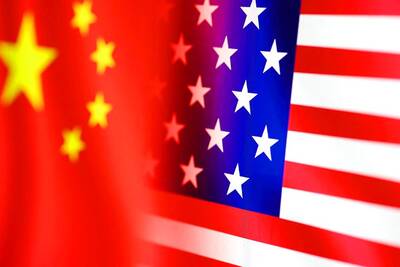
‘RELATIVELY STRONG LANGUAGE’: An expert said the state department has not softened its language on China and was ‘probably a little more Taiwan supportive’ China’s latest drills near Taiwan on Monday were “brazen and irresponsible threats,” a US Department of State spokesperson said on Tuesday, while reiterating Washington’s decades-long support of Taipei. “China cannot credibly claim to be a ‘force for stability in a turbulent world’ while issuing brazen and irresponsible threats toward Taiwan,” the unnamed spokesperson said in an e-mailed response to media queries. Washington’s enduring commitment to Taiwan will continue as it has for 45 years and the US “will continue to support Taiwan in the face of China’s military, economic, informational and diplomatic pressure campaign,” the e-mail said. “Alongside our international partners, we firmly
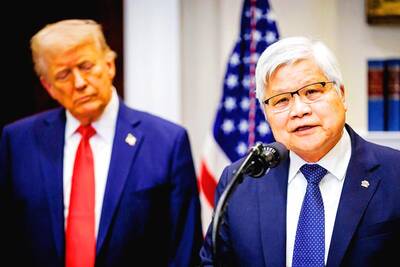
KAOHSIUNG CEREMONY: The contract chipmaker is planning to build 5 fabs in the southern city to gradually expand its 2-nanometer chip capacity Taiwan Semiconductor Manufacturing Co (TSMC, 台積電), the world’s biggest contract chipmaker, yesterday confirmed that it plans to hold a ceremony on March 31 to unveil a capacity expansion plan for its most advanced 2-nanometer chips in Kaohsiung, demonstrating its commitment to further investment at home. The ceremony is to be hosted by TSMC cochief operating officer Y.P. Chyn (秦永沛). It did not disclose whether Premier Cho Jung-tai (卓榮泰) and high-ranking government officials would attend the ceremony. More details are to be released next week, it said. The chipmaker’s latest move came after its announcement earlier this month of an additional US$100 billion
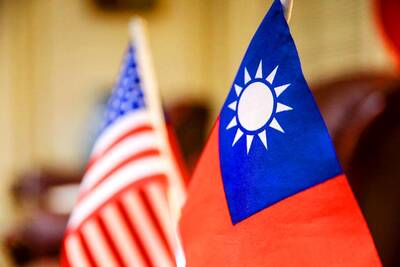
COUNTERING THE PLA: While the US should reinforce its relations with partners and allies, Taiwan must invest in strengthening its defenses as well, Phillip Davidson said If influence in the Indo-Pacific region is one of the US’ core interests, then Taiwan serves as a cornerstone of US economic and security influence in the region, former US Indo-Pacific Command commander admiral Phillip Davidson said on Thursday. “China’s ... strategy is to supplant the US leadership role in the international order ... and they’ve long said ... that they intend to do that by 2050,” Davidson told the National Review Institute’s Ideas Summit in Washington. Davidson said he had previously told US Senate hearings on China’s military activities and possible threats in the Indo-Pacific region that a Chinese invasion of